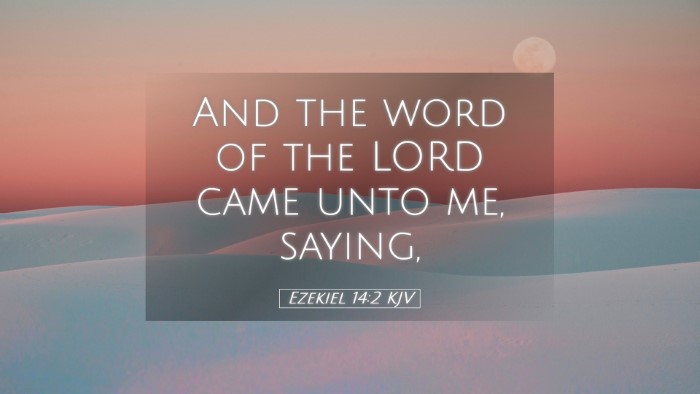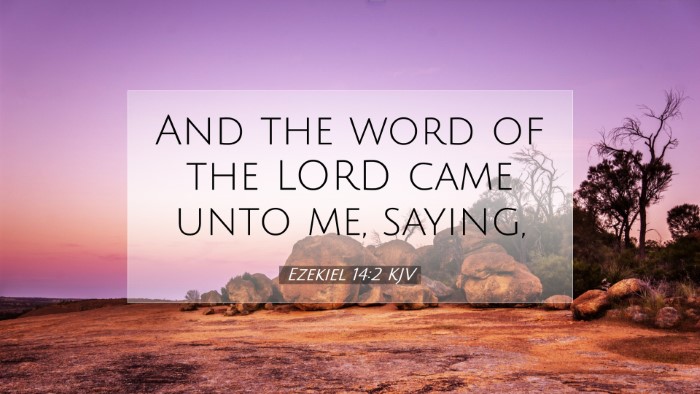Ezekiel 14:2 - A Comprehensive Commentary
Scriptural Text: "And the word of the Lord came unto me, saying," (Ezekiel 14:2, KJV)
Introduction
This verse marks a critical juncture in Ezekiel's prophetic ministry. It introduces a dialogue between God and the prophet, showcasing the necessity of divine revelation in interpreting Israel's spiritual condition.
The Context of Ezekiel
The book of Ezekiel is set against the backdrop of the Babylonian exile. As a priest and prophet, Ezekiel's task was to confront Israel's idolatry, proclaim judgment, and call for repentance. His messages were both dire and hopeful, necessitating a deep understanding of the divine will.
Exegesis of Ezekiel 14:2
In this verse, the phrase "the word of the Lord came unto me" is significant. It indicates a fresh revelation and underlines Ezekiel's role as a mouthpiece for divine truth.
Divine Authority
Matthew Henry emphasizes that the prophet’s messages are grounded in divine authority. The phrase suggests that Ezekiel is not speaking from personal opinion but is relaying God's directives, which are immutable and sovereign over Israel.
God's Initiative in Revelation
God initiates dialogue. Albert Barnes points out that God's willingness to communicate with Ezekiel exemplifies His desire for relationship and revelation. This reflects the nature of prophetic ministry as not merely delivering judgment but fostering a conversation with His people.
Understanding Idolatry and Its Consequences
The context of the following verses sheds light on the problem of idolatry among the elders of Israel. Adam Clarke interprets this section as a critique of the leaders’ reliance on false gods, which led to their downfall.
- Idolatry Defined: Clarke describes idolatry as anything that takes the place of God in the human heart.
- Consequences of Idolatry: Both Henry and Barnes note that when Israel turned to idols, they forfeited God’s protection and guidance, which ultimately led to their exile.
Lessons for Today
The implications of Ezekiel 14:2 for contemporary readers are profound. Leaders, pastors, and Christians alike are called to consider what idols may exist in their lives and ministries.
- Self-Reflection: This verse serves as an invitation for introspection. Are there areas in our lives where we have become complacent or distracted by worldly concerns?
- Seeking Divine Guidance: The necessity of divine revelation in personal and communal faith remains crucial. Regular engagement with Scripture is encouraged to discern God’s voice.
The Role of the Prophet
Further insights from Henry suggest the multifaceted role of the prophet as both a messenger of warning and a facilitator of God’s mercy.
- Messengers of Warning: The tension between judgment and mercy is a recurring theme in Ezekiel's ministry.
- Hope in Despair: Despite the impending judgment, there remains the assurance of God’s steadfast love and the promise of restoration.
Concluding Thoughts
Albert Barnes closes with a reminder that the dialogue instigated by God demonstrates His grace and commitment to His people. In their darkest moments, God still sought to communicate with them.
This verse encourages readers today to remain open to God's word, to listen actively, and to respond with repentance and faith.


